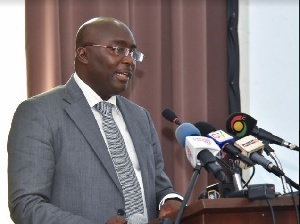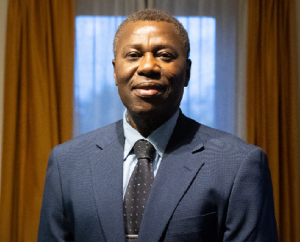Vice President, Dr. Mahamudu Bawumia, has indicated that the ongoing measures to formalise the economy is an attempt by the government to broaden the tax net to enhance compliance and to curb the irregularities in the revenue mobilisation setup.
“While we seek to reduce the tax burden on the business and individuals, government at the same time, is taking steps to spread the remaining burden more broadly and more equitably across the economy.
We are putting in place measures that formalise the economy to spread the tax pace by increasing compliance in this regard,” he said in speech read on his behalf by the Deputy Finance Minister, Kweku Kwarteng, at a gathering of tax experts and private sector businesses in Accra.
According to him, government is mindful of the fact that its various socio-economic interventions could only be achieved by reducing the cost of doing business while maintaining macro-economic stability through fiscal discipline to spur private sector investment.
He said: “Government is working with the service sector of the economy to provide the support that our manufacturers and industry community require.
We appreciate that the booming industrial economy will provide a market and incentives for agricultural and raw material production.”
The tax conference has over the years played an important role in generating ideas and informing tax policy.
“Government has set itself a target of making Ghana the most business trendy and people friendly economy in Africa, in terms of creating jobs and prosperity for all “, Dr. Bawumia said.
The 7th annual International Tax Conference of the Chartered Institute of Taxation-Ghana was on the theme “Tax reforms: its effects on investments, growth and development”, provided a platform for discussions on topical issues bothering on taxation.
The annual conference creates an environment for interactions between stakeholders in tax practices from Ghana and other countries, including administrators from the Ghana Revenue Authority (GRA), Ministry of Finance and other bodies in the financial sector.
President of the institute, Nii Ayi Aryeetey, explaining the importance of tax reforms to the development of the national economy, pointed out the need for government to realign national strategies for revenue mobilisation in the light of the changing dynamics of domestic and international trade.
He said: “Changes within the fiscal environment by way of tax reforms over the years have covered a wide spectrum of the tax system of the country, ranging from institutional framework for tax policy and administration, through the underlying enactments as well as the process and procedures applied in efforts to ensure optimal revenue mobilisation.”
He said the three –day conference will enable administrators and practitioners in the public and private sector, to examine the effects of the tax reform agenda on investment, growth and development of the Ghanaian economy from the perspective of the major players in the taxation industry in the country.
Business News of Tuesday, 29 August 2017
Source: thebftonline.com













